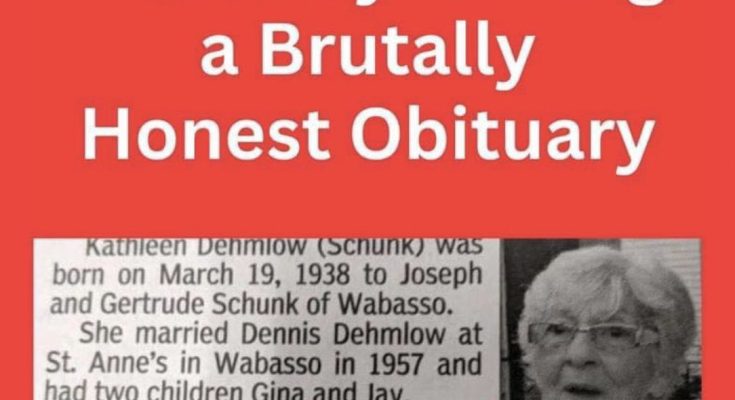Writing an obituary is often an emotional and reflective process. For most families, it’s a chance to honor the memory of a loved one, sharing their life story with the world. However, not all obituaries follow the usual path of warm remembrance. In the case of Kathleen Dehmlow, the obituary penned by her children shocked readers and quickly became the subject of public debate. What began as a standard memorial for a departed mother took an unexpected turn, revealing long-standing family conflicts that would soon captivate an entire community.

A Startling Obituary
When Kathleen Dehmlow’s obituary was published in The Redwood Falls Gazette, it initially appeared to be like any other—until readers reached the end. Her two adult children, who wrote the piece, used the obituary not just as a reflection on her life, but as an opportunity to air grievances that had clearly been simmering for decades. The obituary hinted at family turmoil, noting that Kathleen had made a mistake many years ago and implying that her actions had caused lasting pain.
The bluntness of the final lines left readers both stunned and intrigued. In a surprising move, the children ended the obituary with a statement that seemed more like a final judgment than a loving tribute. This unusual approach caught the attention of many, with readers questioning the family’s motivations for publishing such a personal and critical obituary.
A Community Reacts
The local community was quick to respond. Many people were shocked by the raw honesty of the obituary, while others were disturbed by the airing of such private family matters in a public forum. The obituary sparked outrage, leading The Redwood Falls Gazette to eventually remove it from circulation due to the backlash it received. However, the obituary had already spread across the internet, ensuring that Kathleen’s story—and her family’s grievances—would be seen by far more people than anticipated.
Family members came forward to confirm that the obituary was indeed accurate. According to Dwight, a relative who spoke with the local newspaper, Kathleen had made a significant mistake six decades ago. However, Dwight noted that she had shown regret for her actions and believed that people make mistakes but deserve forgiveness. He suggested that the person responsible for writing the obituary harbored unresolved resentment and had chosen to share that bitterness with the world in one final act.
A Question of Ethics
The publication of Kathleen Dehmlow’s obituary raised important questions about the ethics of printing such content. Should newspapers publish an obituary that is clearly meant to criticize or shame the deceased? The CEO of The Redwood Falls Gazette addressed these concerns, explaining that while the obituary stirred controversy, it did not violate any legal standards. The newspaper had reviewed the content thoroughly before deciding to publish it, noting that their editorial partners maintain strict content guidelines.
Still, some questioned whether it was appropriate to allow an obituary with such a hostile tone to be printed. After all, obituaries are traditionally meant to honor the deceased, not drag them through the mud. The unique nature of this obituary left readers conflicted—was it a justified airing of truth, or an unnecessary display of family dysfunction?
The Emotional Impact of Obituaries
Typically, when a family writes an obituary, it serves as a final tribute to their loved one, capturing their essence with warmth and nostalgia. In this case, Kathleen Dehmlow’s children took a different route, using the opportunity to express their unresolved feelings in a very public way. Their decision to write such a blunt and critical obituary highlights the fact that not every family is interested in sugarcoating the past.
While most families aim to remember the good times and celebrate the life of their loved one, others feel the need to present a more unfiltered version of events. In the case of Kathleen Dehmlow, her obituary became not just a reflection of her life, but also a reflection of the complex and sometimes painful relationships within her family.
Conclusion
Kathleen Dehmlow’s obituary serves as a reminder that not all memorials are written with affection. Sometimes, they expose deep-seated family tensions that can’t be hidden, even in death. This case has left many wondering whether it’s ever appropriate to use an obituary as a platform for unresolved emotions. Ultimately, the story of Kathleen’s obituary is one of family conflict, forgiveness, and the unexpected ways in which grief can be expressed.



